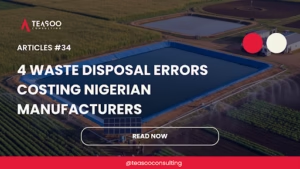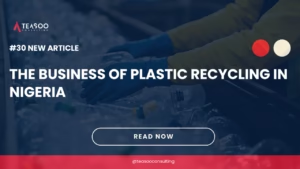
The Niger Delta, Nigeria’s oil-rich heartland, has long suffered the environmental and social costs of crude oil extraction. From oil sludge and drill cuttings to flared gas and plastic residues, vast amounts of waste pollute its waterways, destroy farmlands, and harm local livelihoods. Yet, through innovative oil waste management and waste-to-wealth initiatives, these byproducts can be transformed into valuable resources. By adopting circular economy principles, the region can create jobs, protect ecosystems, and achieve sustainable development.
1. Oil Sludge Recycling
Oil sludge, often dumped in open pits, contains hydrocarbons that can be recovered and reused. Advanced treatment plants can extract usable oil while converting remaining residues into asphalt for road construction or bricks for housing.
Case Study: In India, oil sludge treatment plants recover millions of litres of oil annually, reducing waste volumes and generating additional fuel for refineries. Adopting similar technology in the Niger Delta could provide cheaper materials for roads while reducing hazardous waste.
2. Gas-to-Energy Conversion
Gas flaring, a common practice in the Niger Delta, wastes valuable resources while releasing toxic emissions. Instead of burning gas into the atmosphere, small-scale gas capture and conversion plants can generate electricity for surrounding communities.
Case Study: In Edo State, Nigeria, pilot gas-to-power projects have already supplied industrial clusters with reliable electricity. Scaling up such projects across the Delta could power schools, health centres, and small businesses, supporting economic growth while cutting carbon emissions.
3. Recycling Oil-Based Plastics and Derivatives
Oil-derived plastics and polymers, if unmanaged, contribute to widespread pollution. However, these materials can be recycled into affordable roofing sheets, pavement blocks, or even fuel substitutes for local industries.
Case Study: In Ghana, start-ups have pioneered turning plastic waste into construction materials and alternative fuels, creating jobs for youth and reducing landfill burden. If replicated in the Niger Delta, such enterprises could lower housing costs and stimulate the construction sector.
Environmental and Economic Benefits
By converting oil waste into usable resources, the Niger Delta would see significant environmental improvements. Mangrove forests and wetlands could begin to recover as soil and water contamination decline, while reduced gas flaring would lower greenhouse gas emissions. At the same time, waste-to-wealth initiatives would boost local economies, generating thousands of jobs in recycling, energy, and green construction. Women and young people, often excluded from traditional oil jobs, could find new opportunities in these emerging industries.
Call to Action
The Niger Delta stands at a defining moment. Rather than viewing oil waste as a liability, it can become a driver of prosperity. Governments must enforce stricter waste regulations and provide incentives for recycling initiatives. Oil companies should invest in local waste-to-wealth technologies as part of their corporate social responsibility. Communities, too, must be empowered with training and resources to participate in this new circular economy.
Transforming oil waste management into a pillar of sustainable development is more than an environmental necessity; it is an economic opportunity. By turning waste into wealth, the Niger Delta can chart a new path where pollution gives way to prosperity, and degraded lands evolve into thriving, resilient communities.






